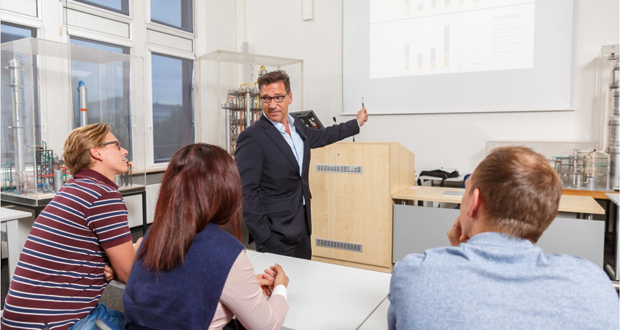“Rare earths” are an essential part of modern technology. These metals – which, despite their name, are not actually very rare – are used in a large number of high-tech applications, including high-performance magnets that can be found e. g. in wind turbine generators or electric car engines. The market is currently dominated by Chinese producers. A German-Brazilian research project wants to offer an alternative. Under the “Rare Earth Global Industry and New Application” (REGINA) project, industrial engineering expert Prof. Alfred Niski from Georg Agricola Technical University (THGA) in Bochum/Germany is investigating marketing opportunities (Figure 1). The Federal Ministry of Education and Research (BMBF) is donating around 280,000 € to fund Prof. Niski’s research over the next three years.
“At the moment, China is a quasi-monopolist for rare earths and also dominates the market for products based on them, such as high-performance magnets,” says Prof. Niski. “Its market-dominating position means it can dictate the prices, which can put industrial customers in Germany, e. g., at a disadvantage. In addition, environmental and social standards are often not adhered to in Chinese production. In applications such as electromobility or regenerative energy production this is simply unacceptable.” However, REGINA is focussing on the emerging market of Brazil. With around 22 mt, it has the second-largest reserves of rare earth metals in the world (China: 55 mt). Eight partners from Germany and Brazil – four universities, three non-university research institutes and one raw materials company – want to support the development of Brazilian reserves locally in the joint research project, and to optimise the entire value chain from the processing of raw materials to their use in high-tech products.
The team of researchers under Prof. Niski at THGA will firstly investigate the market for rare earth-based high-performance magnets and compare it against a strength/weakness analysis of Brazilian production. Taking this as a basis, the Bochum-based industrial engineers will then develop strategies and concrete business models, taking into account the political aspects of raw materials. The aim is to establish Brazil as the second noteworthy supplier of rare earths in Germany. “Rare earths are a key factor in the supply of raw materials in Germany,” says Prof. Niski. “It is important that German companies do not make themselves unilaterally dependent on China, but have alternatives in the form of Brazilian suppliers. I hope that, with our work, we can contribute to greater sustainability from an ecological, economic and social perspective. The aim should be for rare earth products to be produced in a fairer, cleaner way than in the past.”
More support is currently being sought for Prof. Niski’s project team: Master’s graduates in technical business management or industrial engineering can apply to Prof. Niski for a position as a research associate. There is also the opportunity to pursue doctoral studies.
The following institutions and companies are participating in REGINA:
- Fraunhofer Institute for Silicate Research ISC/Fraunhofer Project Group for Materials Recycling and Resource Strategies IWKS;
- Darmstadt Technical University;
- Helmholtz Institute Freiberg for Resource Technology;
- Clausthal Technical University;
- Georg Agricola Technical University;
- CERTI Centros de Referência em Tecnologias Inovadoras (Centers of Reference in Innovative Technologies, Florianópolis, Brazil);
- Universidade Federal de Santa Catarina (Santa Catarina University, Florianópolis, Brazil); and
- Companhia Brasileira de Metalurgia e Mineração (CBMM), Araxá, Brazil.
REGINA is supported by the BMBF under the “CLIENT II – International Partnerships for Sustainable Innovations” funding scheme within the “FONA – Research for Sustainable Development” framework funding programme. (THGA/Si.)
